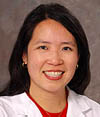
New funding will support a novel smoking-cessation study focused on Chinese-American smokers and nonsmokers who live in the same residence.
Posted July 21, 2010
Elisa Tong, assistant professor of general internal medicine, has been awarded an $890,000 Research Scholar Grant from the American Cancer Society to conduct a novel smoking-cessation study focused on Chinese-American smokers and nonsmokers who live in the same residence.
This month, Tong will begin targeting approximately 300 San Francisco households in which a smoker lives with a nonsmoker. She and her research team plan to educate participants about the dangers of tobacco-smoke exposure using information from scientific studies. They then will counsel the pairs about the benefits of living together in a smoke-free residence.
The Research Scholar Grants are designed to support studies in basic, preclinical, clinical and epidemiologic research to advance health. Tong's research aims to translate the known benefits of smoke-free policies and recommendations into actual clinical interventions to benefit smokers and nonsmokers. It also will encourage ongoing social support to establish smoke-free environments in the home.
Tong is collaborating with the Chinatown Public Health Center and its health education team to conduct her research within the Chinese-speaking community. She says male immigrants from China have high rates of smoking and are less inclined to enroll in cessation programs compared to other groups. With 1 in 3 of the world's smokers in China, and with half of that nation's nonsmoking population exposed to secondhand smoke, Tong's project has the potential of far-reaching health benefits beyond San Francisco's Chinese community.
 “Almost all Chinese smokers who responded to a 2004 statewide survey acknowledged that their family wanted them to quit.”
“Almost all Chinese smokers who responded to a 2004 statewide survey acknowledged that their family wanted them to quit.”
— Elisa Tong
"The Chinese may be particularly responsive to smoke-free messages when they are linked to certain social group norms," said Tong, whose previous tobacco-related studies include an analysis of smoke-free rules in the home and indoor work areas among Chinese- and Korean-American women. "Almost all Chinese smokers who responded to a 2004 statewide survey acknowledged that their family wanted them to quit. A well-crafted cessation program that speaks collectively to Chinese Americans could be very effective because traditional Chinese society emphasizes the 'group' more than the 'individual.'"
About AANCART
The Asian American Network for Cancer Awareness, Research and Training is a cooperative agreement between the National Cancer Institute (NCI) and UC Davis. It is the first-ever national cancer awareness research and training infrastructure intended to specifically address Asian-American concerns. Click here to learn more.
Tong's current study is based on earlier research, funded by the National Cancer Institute through the Asian American Network for Cancer Awareness Research and Training (AANCART). That pilot project, also in collaboration with Chinatown Public Health Center, found both Chinese smokers and nonsmokers were receptive to discussing smoking-cessation information that emphasized secondhand smoke concerns. Participants indicated that messages from health professionals, communication examples and laboratory results of smoke exposure could help them to better grapple with household discussions about quitting smoking and eliminating exposure to secondhand smoke. Tong is conducting similar work in the general English-speaking population with a study funded by the UC Davis Clinical and Translational Science Center.
Collaborators on the Research Scholar Grant include Debora Paterniti, associate adjunct professor of internal medicine and sociology; Chin-Shang Li, associate professor of biostatistics; and Janice Tsoh, associate adjunct professor of psychiatry at UC San Francisco. Community advisory groups for study assistance and dissemination include the San Francisco-based Chinese Council, AANCART and the American Cancer Society's New York-based Asian Initiatives program.